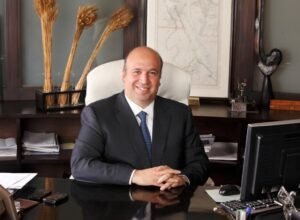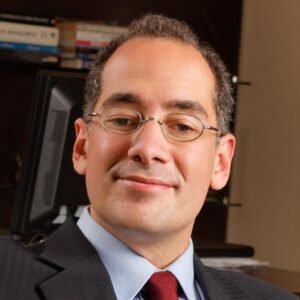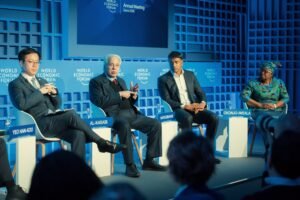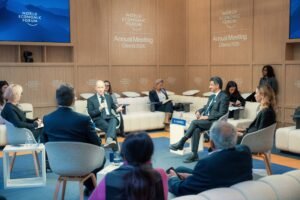RLC Global Forum Opens in Riyadh, Bridging Global Strategy and Regional Reality
The 2026 RLC Global Forum opened today in Riyadh under the theme Growth Crossroads. Held at the Fairmont Riyadh, the two-day Forum brings together regional and international voices from retail, technology, investment, real estate, academia, and policy in a setting designed to encourage meaningful interactions and strategic networking. The program explores the intersection of retail and related sectors, with a focus on how to turn strategy into execution.
The Forum was officially opened with a keynote address by His Excellency Ammar Nagadi, Vice Minister of Economy and Planning, who set the tone by addressing economic transformation, competitiveness and sustainable growth. His Excellency highlighted Saudi Arabia’s ambition to play a leading role in shaping the future of the consumer and retail economy through innovation, investment and cross-sector collaboration.
The first day featured high-impact discussions examining the forces shaping the next phase of global retail. Philipp Carlsson-Szlezak, Managing Director and Partner and Global Chief Economist at Boston Consulting Group (BCG), offered a macroeconomic read on shifting global conditions during the session Geoeconomics and the New Consumer Economy at Crossroads. He examined how regional economic choices are influencing demand, competitiveness, and consumer behavior, and which signals matter most as leaders navigate an increasingly fragmented outlook.
From macro to management, Engineering Growth in a Pressured Market brought together Dr. Bander Hamooh, CEO of Panda Retail Company, and John Hadden, CEO of Alshaya Group, to explore how consumer-facing businesses are responding to margin pressure, regulatory complexity and softening demand.
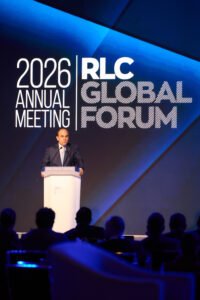
John Hadden, CEO at Alshaya Group said, “The 2026 RLC Global Forum in Riyadh marked our inaugural event as Partner. At a time when uncertainty and volatility have become the new norms globally, sharing insights on how to turn pressure into strategic momentum and build resilience is critical. For us, that means using data to inform strategy, staying focused on our customers, and empowering our people to deliver great service.”
As new retail formats emerge, destination strategies are becoming more selective and intentional. The Changing Economics of Retail Destinations session examined how destination thinking is moving beyond scale alone. Featuring insights from Alison Rehill-Erguven, CEO, Cenomi Centers; Ayman Mohammed Al Burti, CEO, Azad Properties; Abdullah Al Tamimi, CEO, Hamat Holding; and Georges Barakat, Head of Market & Commercial Strategy – Retail, Local Real Estate Investment Division, Public Investment Fund (PIF), the discussion focused on which decisions create lasting value in the Kingdom’s retail landscape.
Attention also shifted to the role of artificial intelligence (AI) with multiple sessions delving into its transformative potential across the retail sector. In a one-on-one conversation, Charbel Sarkis, Regional Director – MENA at Google, and Michael Chalhoub, CEO of Chalhoub Group, reflected on how CEOs pursue growth, deploy intelligence, and steer organizations through accelerating change while preserving what differentiates their brands
Michael Chalhoub, CEO of Chalhoub Group, said: “We’re proud to have partnered with RLC, as we strongly believe in the power of collaboration and in coming together as retail leaders to grow the market in Saudi Arabia, create new opportunities, and collectively address shared challenges. One topic that is particularly important to us is artificial intelligence, not as a replacement for the human dimension of luxury, but as a way to enhance it. At Chalhoub Group, we see AI as a strategic enabler of Vision 2033, helping us better understand our customers, strengthen partnerships, and deliver experiences that are more personal, seamless, and culturally relevant across the region.”
 As consumers increasingly seek meaning, immersion, and emotional connection, lifestyle destinations are evolving beyond collections of stores, into places designed to engage and inspire. During the New Ecosystems of Desire: Building Experiences Through Lifestyle Destinations session, Shane Eldstrom, CEO of United Developers, Qatar, Sylvie Freund-Pickavance, Strategy and Business Development Director at Value Retail, and Rahul Prasad, Managing Director for Asia Pacific, Middle East and India at Pike Preston Partners, examined how operators, investors, and curators develop destinations as experience ecosystems, where retail, culture, and storytelling work together to drive engagement and long-term relevance.
As consumers increasingly seek meaning, immersion, and emotional connection, lifestyle destinations are evolving beyond collections of stores, into places designed to engage and inspire. During the New Ecosystems of Desire: Building Experiences Through Lifestyle Destinations session, Shane Eldstrom, CEO of United Developers, Qatar, Sylvie Freund-Pickavance, Strategy and Business Development Director at Value Retail, and Rahul Prasad, Managing Director for Asia Pacific, Middle East and India at Pike Preston Partners, examined how operators, investors, and curators develop destinations as experience ecosystems, where retail, culture, and storytelling work together to drive engagement and long-term relevance.
Beyond the main stage, roundtables, workshops and track sessions enabled deeper discussions across categories and industry trends, amplifying the Forum’s emphasis on practical insight and peer-level exchange.
Participants now look ahead to Day 2, when the top three teams of the NextGen Retail Challenge, a joint initiative between RLC Global Forum, the Innovation and Entrepreneurship Center at Princess Nourah bint Abdulrahman University (PNU) and Monsha’at, the Small and Medium Enterprises General Authority, will be announced. The initiative is designed to empower emerging Saudi talent through mentorship, capability-building and global retail exposure.




